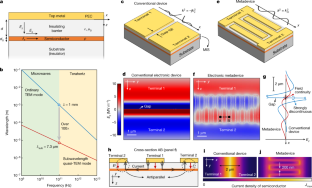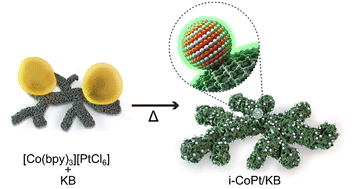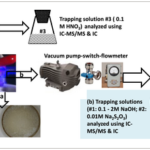2023-02-17 スイス連邦工科大学ローザンヌ校(EPFL)
◆EPFLの工学部パワー&ワイドバンドギャップ・エレクトロニクス研究室(POWERlab)のElison Matioli氏は、これ以上小型化しても、エレクトロニクスの性能を向上させる解決策にはならない、と説明する。「しかし、窒化ガリウムを用いた材料の場合、周波数の点で最高のデバイスは、数年前にすでに発表されています」と彼は言う。「デバイスのサイズを小さくすると、根本的な限界に直面するのです。これは、使用する材料に関係なく言えることです」。
◆この課題に対し、マティオリと博士課程学生のモハマッド・サミザデ・ニクーは、これらの限界を克服し、新しいクラスのテラヘルツデバイスを実現できるエレクトロニクスへの新しいアプローチを考え出した。窒化ガリウムと窒化インジウムガリウムからなる半導体に、メタ構造と呼ばれるパターニングされた接点を波長以下の距離にエッチングし、デバイスを縮小するのではなく、配置を変えたのだ。このメタ構造により、デバイス内部の電界を制御することができ、自然界には存在しないような驚異的な特性が実現された。
◆このデバイスは、テラヘルツ帯(0.3〜30テラヘルツ)の電磁波で動作することができ、現在の電子機器に使われているギガヘルツ波よりもはるかに速い周波数で動作します。これは、現在の電子機器に使われているギガヘルツ波よりもはるかに高速です。そのため、与えられた信号や周期に対してより多くの情報を伝達することができ、6G通信やそれ以降のアプリケーションに大きな可能性をもたらします。
◆サミザデ・ニクーは、この画期的な技術に関する論文の筆頭著者として、最近『Nature』誌に発表した。
<関連情報>
- https://actu.epfl.ch/news/electronic-metadevices-break-barriers-to-ultra-fas/
- https://www.nature.com/articles/s41586-022-05595-z
テラヘルツ波応用の電子メタデバイス Electronic metadevices for terahertz applications
Mohammad Samizadeh Nikoo & Elison Matioli
Nature Published:15 February 2023
DOI:https://doi.org/10.1038/s41586-022-05595-z

Abstract
The evolution of electronics has largely relied on downscaling to meet the continuous needs for faster and highly integrated devices1. As the channel length is reduced, however, classic electronic devices face fundamental issues that hinder exploiting materials to their full potential and, ultimately, further miniaturization2. For example, the carrier injection through tunnelling junctions dominates the channel resistance3, whereas the high parasitic capacitances drastically limit the maximum operating frequency4. In addition, these ultra-scaled devices can only hold a few volts due to the extremely high electric fields, which limits their maximum delivered power5,6. Here we challenge such traditional limitations and propose the concept of electronic metadevices, in which the microscopic manipulation of radiofrequency fields results in extraordinary electronic properties. The devices operate on the basis of electrostatic control of collective electromagnetic interactions at deep subwavelength scales, as an alternative to controlling the flow of electrons in traditional devices, such as diodes and transistors. This enables a new class of electronic devices with cutoff frequency figure-of-merit well beyond ten terahertz, record high conductance values, extremely high breakdown voltages and picosecond switching speeds. This work sets the stage for the next generation of ultrafast semiconductor devices and presents a new paradigm that potentially bridges the gap between electronics and optics.



